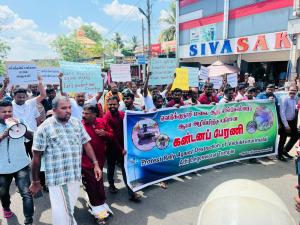Sri Lanka’s Cultural Genocide Against Tamils Escalated After The IMF Bailout
FGTO calls upon all Sri Lanka's creditors, IMF, and World Bank to prioritize the rights of Tamils as Sri Lanka escalates cultural genocide after IMF bailout
BELOW, PLEASE FIND THE FULL STATEMENT:
After the recent International Monetary Fund (IMF) bailout, the Sri Lankan government archeology department targeted and destroyed Tamil heritage sites in the border area of Tamil Eelam. As indigenous people and a nation, Tamils have lived in the Tamil Eelam for over 2500 years. With a similar ideology to Myanmar, Buddhist Sinhala extremism alongside the Sri Lankan governments has been committing genocide against Tamils. Cultural genocide is a part of Sri Lanka’s intentions to destroy Tamils, and the government burned down the largest Tamil library in South Asia in 1981. The Sri Lankan government is also well known for its aerial bombing of Churches and Temples during three decades of war against Tamils. The aerial bombing of Navali St. Peter’s Church in 1995 is one example. Another recent example is the full destruction of a historic Aathi Sivan temple in Keerimalai and the building of a presidential mansion under military occupation. In 2023, the trend of destroying Tamil heritage sites escalated after the IMF bailout was a major concern of Tamil.
Sri Lanka’s debt problems result directly from borrowing to finance its genocidal war on Tamils and to occupy the territory of Tamil Eelam. Therefore, the Tamil diaspora requested IMF to tie any economic resources to ratify the Rome Statue so that it would pave the way for international justice for the crimes of genocide committed by government officials, military commanders, and former presidents. However, IMF bailed out without such human rights considerations or good governance in place; as a result, the Sri Lankan government recently destroyed Tamil heritage sites as part of the ongoing cultural genocide.
An analysis of the ethnic composition of Tamil-majority districts indicates that between 1953 and 1981 the Sinhalese population in the Trincomalee District increased by 465%, while the Tamil population increased by only 149% during the same period. Moreover, the Sinhalese population in the Eastern Province, as a whole, increased by 435%, while the Tamil population increased by a mere 145% during the same period. In the Northern Province, the Sinhalese population increased by 137%, while the Tamil population increased by only 92% during the same period. Moreover, the Tamil population did not exceed 10% of the total population in any of the Sinhalese-majority districts in 1981. In contrast, the Sinhalese population in the Tamil-majority districts of Vavuniya, Trincomalee, and Amparai are as high as 16.55%, 33.62%, and 37.5%, respectively. Indeed, Sinhalese colonization has changed the ethnic composition of Tamil-majority districts and reduced the size of the area Eelam Tamil is regarded as their traditional homeland. The ongoing cultural genocide aimed at after the IMF bailout can be seen as satisfying the Sinhala Buddhist extremists in the South. The International community, especially the Western democracies, should ensure that the Tamil genocide is recognized and that Tamils are protected in their land.
In Tamil Eelam, between 1989 and 2009, there were 27 Tamil heroes’ cemeteries, and six cemeteries were built during the 2008-2009 genocidal war. From the total of 33 cemeteries, many pictures and details can still be found in the digital space. The Tamil heroes’ cemeteries are part of Tamil identities and culture. On November 27, every year, Tamils all over the world continue to remember their heroes who fought against Sri Lanka’s genocide against Tamils, protected Tamils, and safeguarded their freedom and ancient land. The destruction of Tamil heroes' cemeteries was an intentional and planned action by the Sri Lankan Government, noting that those cemeteries were resting places of over 40 thousand Tamil combatants, as remembrances of the dead. The destruction of the cemeteries is also part of the cultural genocide, as it not only prevents Tamils from remembering their loved ones but also intentionally eliminates Tamil identities in Tamil Eelam. We urge the United Nations to take steps to rebuild all the Tamil hero's cemeteries in their original forms at the same location where they previously existed.
Some of the recent events of cultural genocide include renaming the traditional Tamil heritage Kinniya hot spring in Trinco, the destruction of Kurunthoormalai historic Tamil worship place, and the replacement of it with the Sinhala Buddhist temple in Vanni. Several other land grabs in Batticaloa and other places in Tamil Eelam are ongoing.
Tamil Diaspora raises serious concerns about Sri Lanka’s systematic escalation of cultural genocide and calls upon all Sri Lanka's creditors, IMF, and World Bank to prioritize the human rights and rights of the indigenous people of the land over financial return.
Through its violence against Tamils and their heritage, Sri Lanka shows that it will continue the political instability that created its financial difficulties. Sri Lanka's financial distress will not stop until it grants fundamental human rights to all peoples of the island, including the Tamils' right to self-determination through a universally accepted process of referendum conducted and monitored by the United Nations.
Federation of Global Tamil Organizations, http://fgto.org
FGTO
Federation of Global Tamil Organizations
+1 647-875-7354
email us here
Visit us on social media:
Facebook
Twitter
YouTube
Other
TNPF MP Gajendrakumar Ponnambalam Claims Cultural Genocide in North & East Sri Lanka at UNHRC
Legal Disclaimer:
EIN Presswire provides this news content "as is" without warranty of any kind. We do not accept any responsibility or liability for the accuracy, content, images, videos, licenses, completeness, legality, or reliability of the information contained in this article. If you have any complaints or copyright issues related to this article, kindly contact the author above.

